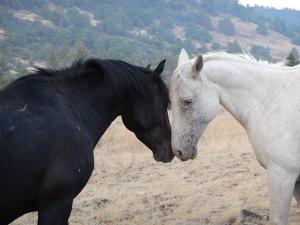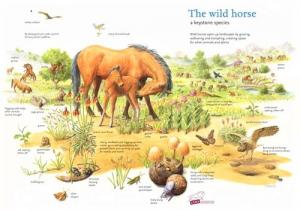Wild Horses: Selective Breeding Using Porcine Zona Pellucida ‘PZP’
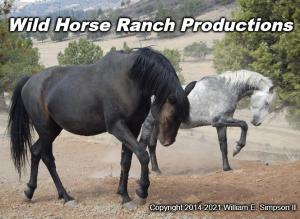
Two wild stallions at Wild Horse Ranch engage in ritual combat that establishes dominance and breeding rights. This is a critical natural process that preserves the species. Photo: William E. Simpson II
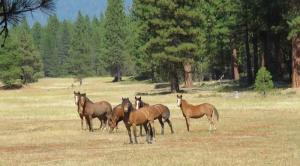
A family of wild horses that lives in a remote forest have symbiotically grazed-in a fire-break, which is protecting a forest of champion old-growth conifirs against catastrophic wildfire.
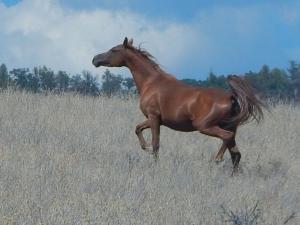
The genetic vitality of wild horses is clearly visible in this gorgeous mare that lives in a wilderness area beyond the reach of advocates shooting horses with PZP and BLM/USFS roundups. Photo: William E. Simpson II
America’s wild horses are a native species and are wildlife in North America, but are being subjected to insidious selective breeding via the use of PZP.
Modern science fully supports that observation, as well as newly published research, at this link:
https://scitechdaily.com/ancient-dna-discovery-reveals-woolly-mammoths-wild-horses-survived-thousands-of-years-longer-than-believed/
Nevertheless, America’s wild horses, which are wildlife, are now being mismanaged by the use of a highly unnatural process of ‘selective breeding’ through the use of chemical contraception methods on wild mares, as well as via random castration of stallions.
Scientists, wild horse advocates and ecologists have totally missed the fact that ‘selective breeding’ is now occurring, as well as the very serious adverse genetic impacts that accompany the use selective breeding on native species American wild horses.
What Is Selective Breeding?
When any human decides which animal(s) gets to breed and which do not via the use of any form of contraception or castration, they have engaged in selective breeding, which is an artificial process that impacts genetic conservation of any species.
Selective breeding is the genesis of the domestication or genetic modification of any species, including wild horses and burros.
So, when we see wild horse advocates and donation-supported wild horse activist organizations supporting and/or using any contraceptive methods on wild horses, including the use of porcine zona pellucida (‘PZP’) or GonaCon, we are witnessing human intervention that is disintermediating the critically important evolutionary process of ‘natural selection’.
Selective breeding leads to genetic weakness.
All anyone needs to do is examine the track record for the many species of animals that have endured selective breeding by humans.
One of many examples that can be made involves the selective breeding that has led to development of the breed standard for the German Shepard dog. As we see in the German Shepard, a result of genetic erosion from selective breeding has led to the genetic defect of hip dysplasia, which is now common in that breed.
Evolutionary natural selection is nature’s system, which has produced a myriad of resilient species that have continued to survive on the planet including wild horses. Environmental conditions, as well as co-evolved predators uniquely apply pressures upon wildlife, which weed-out weak and genetically defective or diseased animals, preventing them from breeding. This allows for the continued genetic vigor of any species.
When humans randomly or by design usurp nature’s process of natural selection, science shows that such human interventions ultimately result in genetic erosion and genetic defects across the board, no exceptions.
In domestic horses, which have been the subject of selective breeding by humans for approximately 4,000-years, we now find that virtually every breed of domestic horse has within each, a breed specific genetic issue(s), evolved from selective breeding by humans.
For instance, according to the Arabian Horse Association:
“Horses, like other species such as dogs, cats and even humans, can be affected by a variety of genetic disorders. Currently, DNA testing is available for ten equine genetic disorders, with three of those disorders of particular interest to Arabian horse owners and breeders:
Severe Combined Immunodeficiency (SCID), Cerebellar Abiotrophy (CA) and Lavender Foal Syndrome (LFS). All three of these disorders are recessive traits; this means that in order for a foal to be affected with the disease, it must have received a copy of the gene mutation from each parent. Horses that have only one copy of the gene mutation are physically normal, but are still carriers and can pass the mutation along to their offspring. While the vast majority of Arabian horses are clear, and do not possess the mutations responsible for these disorders in their genetic code, it is important to be aware that these genetic disorders do exist within the breed.”
The Use of PZP on wild horses (wildlife) by humans is ‘selective breeding’.
It doesn’t matter if the application of PZP is based upon random dosing, or by choosing specific wild horses; it is ‘selective breeding’ when natural selection is circumvented by human interference with natural processes.
Intact stallions must compete for breeding rights over fertile mares.
The evolutionary process of ritual combat between stallions for breeding rights, also preserves the genes of the strongest and smartest stallions. When humans castrate wild stallions, this natural process that tests many stallions is circumvented, leading to remaining potentially inferior stallions having breeding rights by default. Totally unnatural and artificial!
There is absolutely no doubt, based upon science and genetics, that when humans disengage the natural evolutionary process of natural selection, which has led to the success of the species of Equus Caballus over the past 1.7 million years in North America, genetic erosion and genetic defects evolve.
The only question remaining is this: Why would any human that loves wild horses allow them to be subjected to what is clearly the latest trendy form of mismanagement?
One can only surmise that some combination of greed, ego and ignorance is fueling the push to use of selective breeding via PZP upon American wild horses.
The lame excuses that posit the use of PZP as the only option to save wild horses, or to prevent roundups are not consistent with the empirical facts nor legitimate science.
Some wild horse advocates, along with the gold-plated donation-funded non-profit wild horse activist organizations are conflicted by money and ego. And so, they cover-up, ignore and fail to pursue and support the available path of rewilding and relocating wild horses into carefully selected designated wilderness areas, where they will be ‘wild and free as an integral part of the wilderness, and no longer would be in conflict with powerful economic interests, thereby ending roundups and the need for dangerous band-aids like PZP.
The rewilding plan called ‘Wild Horse Fire Brigade’ outlines both existing law for the Human Transfer of Excess Animals (wild horses), as well as a potential amendment the 1971 Act, to allow direct relocation of American wild horses and burros from HMAs in conflict, and into naturally balanced designated wilderness ecosystems.
In the 110-million acres of designated wilderness areas that exist in America, there are at least 20-million acres in the far western states where wild horses can be rewilded in a manner that is both ecologically and economically appropriate.
In these designated wilderness areas, which are at grave-risk from catastrophic wildfires and erosion due to excessive, un-grazed grass and brush, wild horses can resume their naturally-evolved roles as keystone herbivores, thereby reducing wildfire fuels and protecting forests, flora and fauna, watersheds and fisheries.
And in these wilderness ecosystems, nature’s process of natural selection will assure future generations of genetically strong and vibrant wild horses and burros.
The article at RT Fitch titled; ‘Economics vs. Wild Horses: A Management Conundrum with A Silver Lining’ details the issues and the natural cost-effective solution presented by the 'Wild Horse Fire Brigade' plan.
https://rtfitchauthor.com/2021/12/10/economics-vs-wild-horses-a-management-conundrum-with-a-silver-lining/
Further discussion on the issues and a holistic natural solution was presented in a new interview with William E. Simpson II by Wall Street lobbyist 'Staci-lee', and is now available for viewing on YouTube: https://www.youtube.com/watch?v=UyxCx5M4vj4
About the Author:
William E. Simpson II is a naturalist living among and studying free-roaming native species American wild horses in the wilderness. William is the award-winning producer of the micro-documentary film 'Wild Horses'. He is the author of a new Study about the behavioral ecology of wild horses, two published books and more than 150 published articles on subjects related to wild horses, wildlife, wildfire, and public land (forest) management. He has appeared on NBC NEWS, ABC NEWS, theDoveTV and has been a guest on numerous talk radio shows including the Lars Larson Show, the Bill Meyer Show, and on NPR Jefferson Public Radio. William's Film Freeway account offers films, studies, TV & radio interviews, and more HERE: https://filmfreeway.com/WilliamESimpsonII
#WildHorses, #PZP, #SelectiveBreeding, #ReWilding, #WHFB, #WildHorseFireBrigade
William E Simpson II
Wild Horse Ranch Productions
+1 858-212-5762
email us here
'Wild Horses' - A micro-documentary

